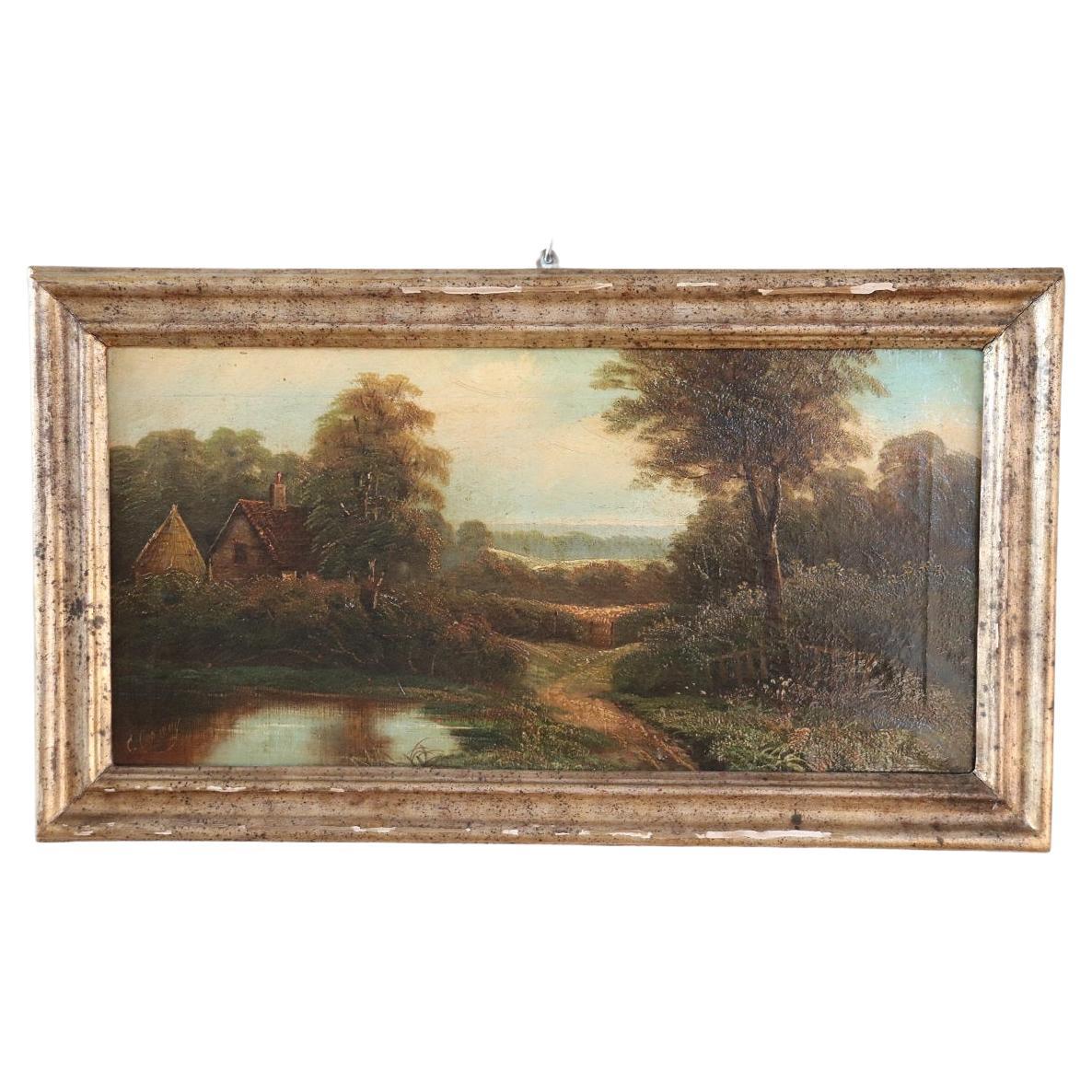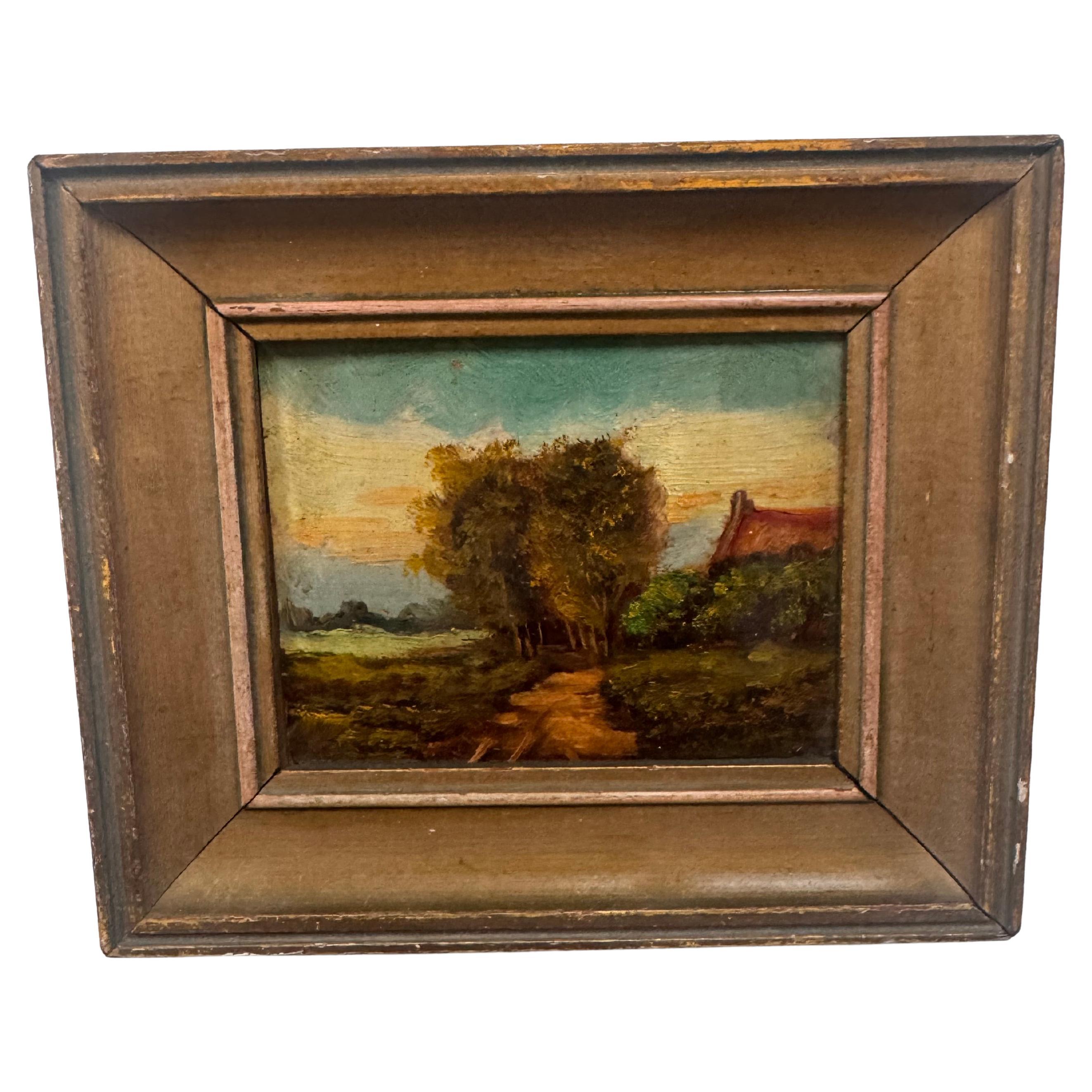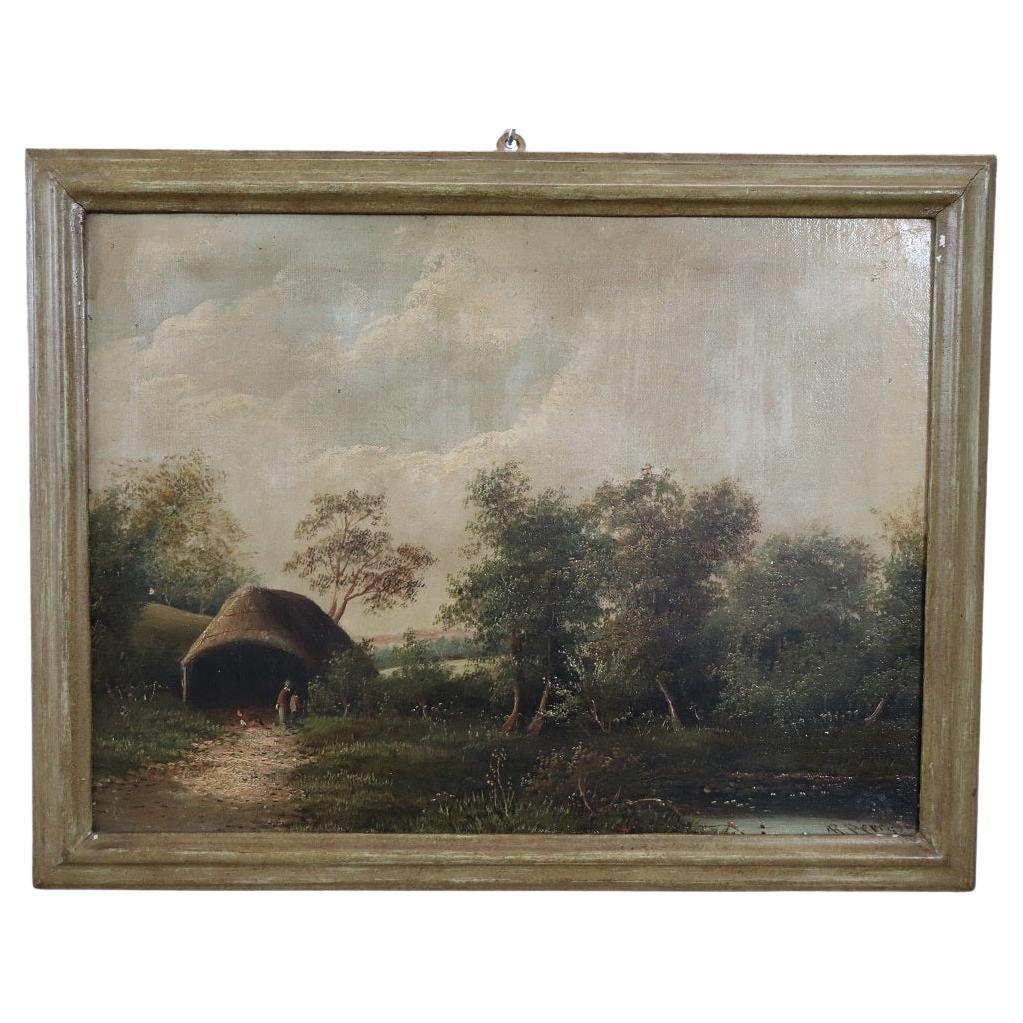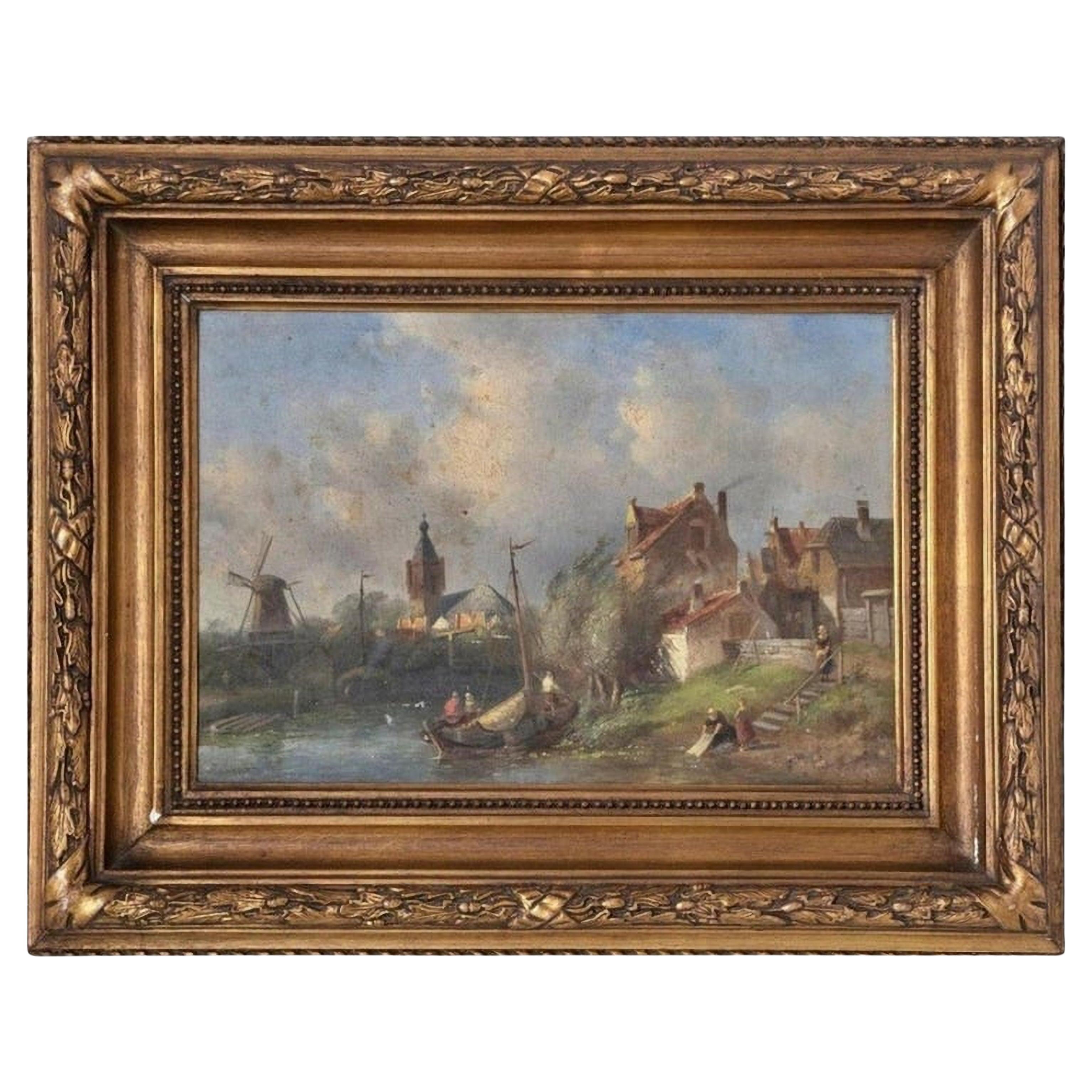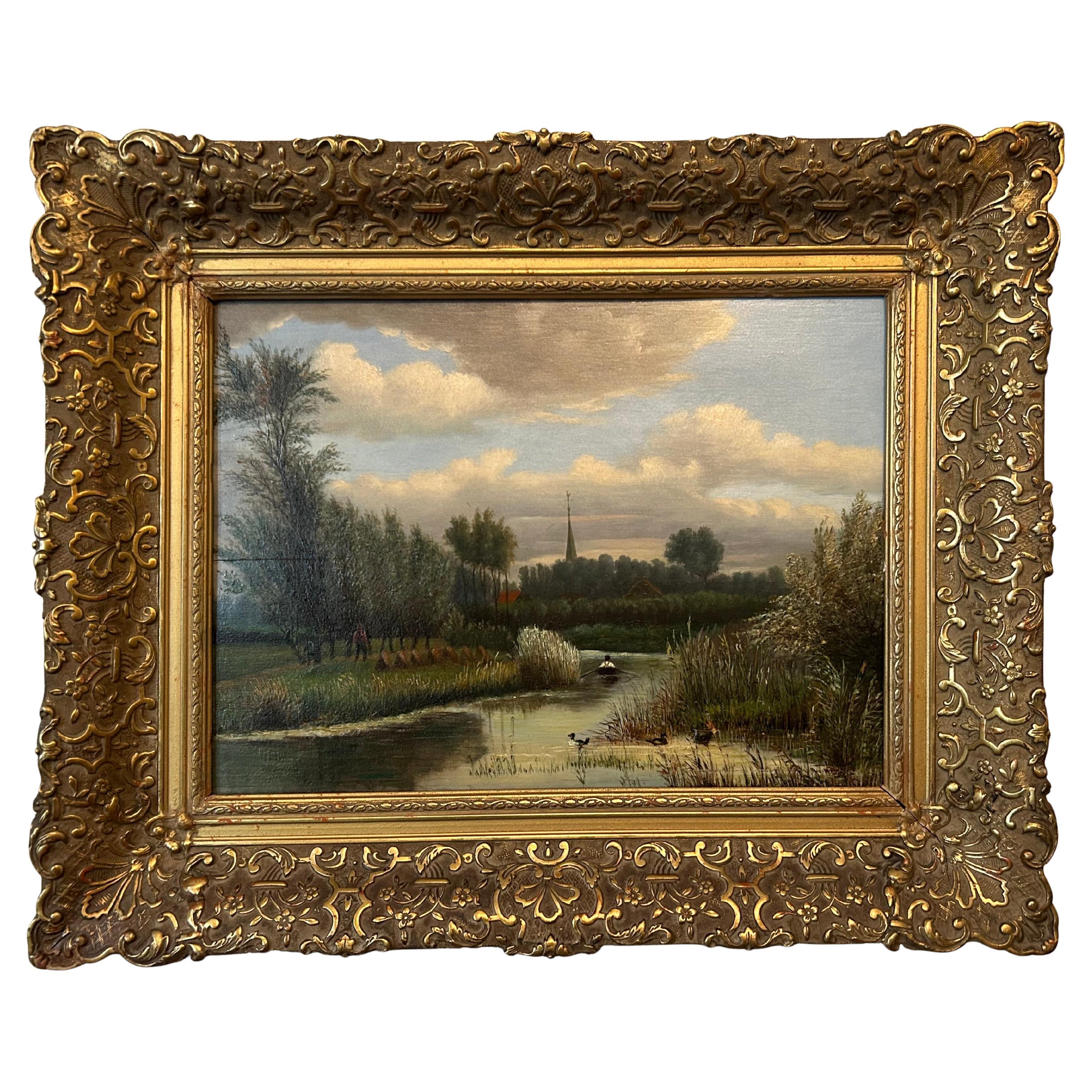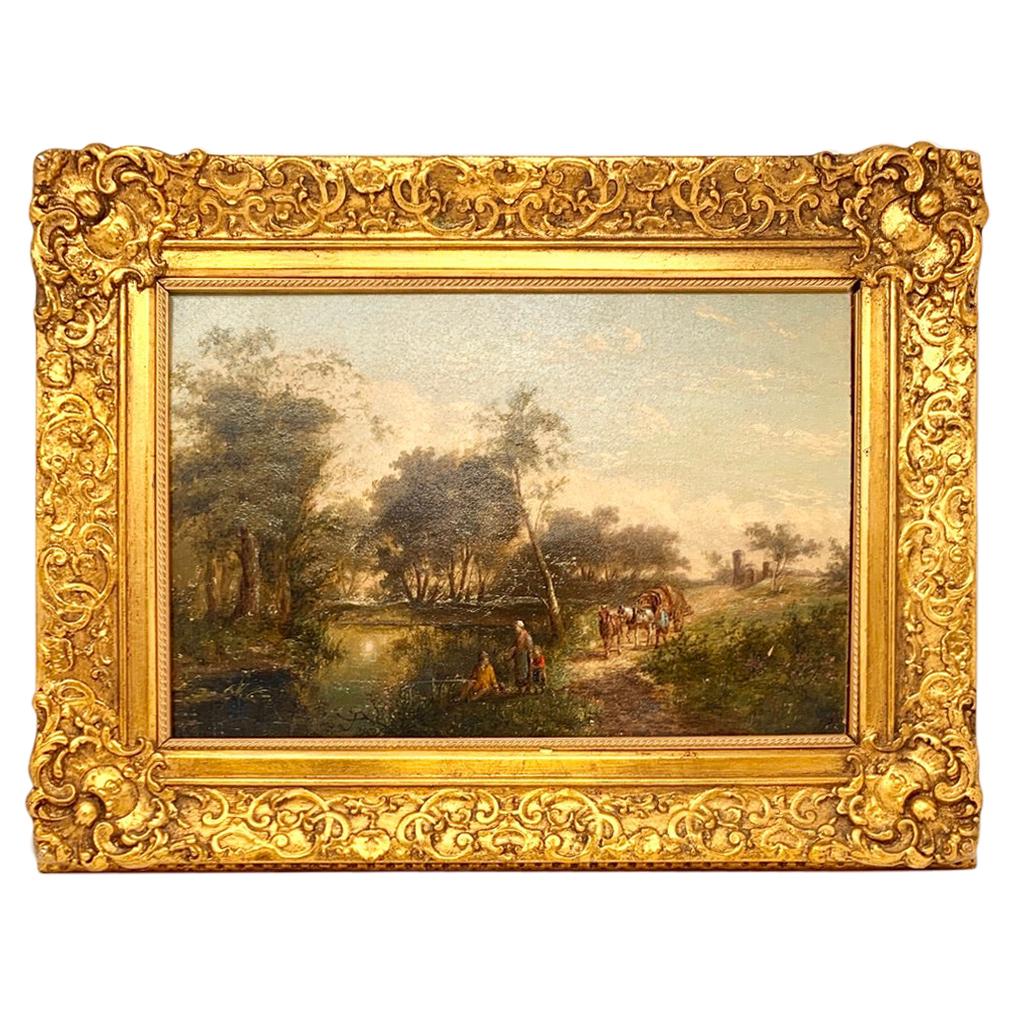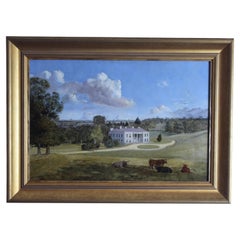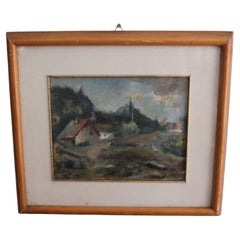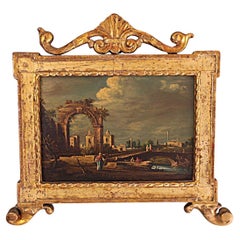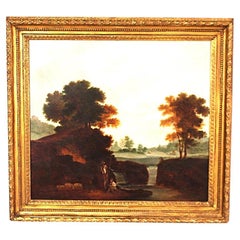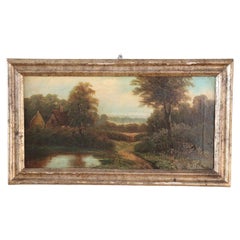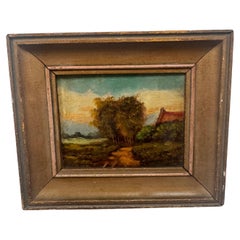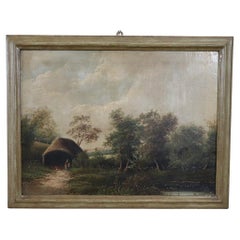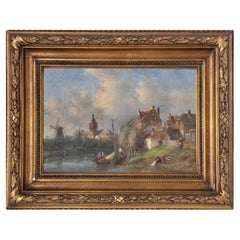Items Similar to Dutch 19th century Landscape Painting
Want more images or videos?
Request additional images or videos from the seller
1 of 11
Dutch 19th century Landscape Painting
$1,156.68
£850
€998.61
CA$1,589.08
A$1,774.05
CHF 929.58
MX$21,716.15
NOK 11,805.64
SEK 11,131.22
DKK 7,452.72
Shipping
Retrieving quote...The 1stDibs Promise:
Authenticity Guarantee,
Money-Back Guarantee,
24-Hour Cancellation
About the Item
This charming oil-on-paper painting captures a serene landscape near Haarlem, evocative of Andreas Schelfhout's masterful Dutch Romantic style. The work features a quintessentially Dutch scene with expansive skies, tranquil waterways, and lush greenery, all rendered with meticulous attention to detail. The dominant feature is the sky, which displays a delicate interplay of clouds and light, reflecting the region's ever-changing weather.
In the foreground, a winding path leads the viewer’s eye through the lush countryside, bordered by tall grasses and scattered wildflowers. A gentle stream meanders through the scene, its surface reflecting the soft hues of the sky. Dotted along the banks are figures engaged in daily activities, adding a narrative element to the picturesque setting.
The composition demonstrates Schelfhout's influence, with its precise rendering of natural elements and atmospheric depth. The delicate brushwork and subtle use of colour convey a sense of calm and nostalgia, which is characteristic of Schelfhout's oeuvre.
While executed by a follower, this painting faithfully embodies the serene beauty and technical finesse of Andreas Schelfhout's landscapes, making it a captivating piece for any admirer of Dutch Romantic art.
- Similar to:Andreas Schelfhout (Artist)
- Dimensions:Height: 24.81 in (63 cm)Width: 19.69 in (50 cm)Depth: 1.19 in (3 cm)
- Style:Late Victorian (Of the Period)
- Materials and Techniques:
- Place of Origin:
- Period:
- Date of Manufacture:1890s
- Condition:Wear consistent with age and use.
- Seller Location:Seaford, GB
- Reference Number:1stDibs: LU10376244754572
About the Seller
New to 1stDibs
Joined in the past six months.
No Reviews Yet
Vetted Professional Seller
Every seller passes strict standards for authenticity and reliability
Established in 2021
1stDibs seller since 2025
Typical response time: 1 hour
- ShippingRetrieving quote...Shipping from: Seaford, United Kingdom
- Return Policy
Authenticity Guarantee
In the unlikely event there’s an issue with an item’s authenticity, contact us within 1 year for a full refund. DetailsMoney-Back Guarantee
If your item is not as described, is damaged in transit, or does not arrive, contact us within 7 days for a full refund. Details24-Hour Cancellation
You have a 24-hour grace period in which to reconsider your purchase, with no questions asked.Vetted Professional Sellers
Our world-class sellers must adhere to strict standards for service and quality, maintaining the integrity of our listings.Price-Match Guarantee
If you find that a seller listed the same item for a lower price elsewhere, we’ll match it.Trusted Global Delivery
Our best-in-class carrier network provides specialized shipping options worldwide, including custom delivery.More From This Seller
View AllEnglish School 19th Century Country House Landscape Oil Painting
Located in Seaford, GB
19th-century painting of Warlies House, Essex
This captivating mid-19th-century oil on panel painting exemplifies the idyllic charm of pastoral landscapes from the period, featuring...
Category
Antique 1870s English Victorian Paintings
Materials
Paint
$2,122 Sale Price
20% Off
Mid 20th Century Landscape Oil Painting in the Manner of Maurice de Vlaminck –
By Maurice de Vlaminck
Located in Seaford, GB
An evocative early 20th century oil painting, executed in the expressive manner of Maurice de Vlaminck, depicting a tranquil rustic village nestled within a moody, wooded landscape. ...
Category
Mid-20th Century Italian Mid-Century Modern Paintings
Materials
Paper
$707 Sale Price
20% Off
Antique Venetian capriccio oil painting
Located in Seaford, GB
Francesco Guardi Venice Oil Painting – Venetian Art in the Manner of Guardi
Exquisite 19th-Century Venetian Oil Painting
Experience the timeless elegance of Venetian art with this r...
Category
Early 20th Century Paintings
Materials
Pine, Paint
$1,687 Sale Price
20% Off
18th century of circle Richard Wilson pastoral Landscape
By Richard Wilson R.A.
Located in Seaford, GB
18th-Century Richard Wilson Landscape – A Masterpiece of British Old Master Art
This 18th-century Richard Wilson landscape, attributed to the circle of Thomas Jones, is a stunning pastoral landscape oil painting that embodies the charm of Georgian-era countryside artwork. As a fine example of British old master landscape art, this piece showcases the elegance and natural beauty of the English countryside, making it a perfect addition to any collection of antique rural landscape art.
A Romantic Countryside Painting with Timeless Appeal
The composition of this romantic countryside painting is thoughtfully balanced, featuring lush greenery, rolling hills, and a tranquil sky. The English countryside oil painting...
Category
Antique 18th Century English Georgian Paintings
Materials
Canvas
Exquisite 19th Century English Still Life of wild flowers– Oil on Wood Panel
Located in Seaford, GB
A captivating and finely executed 19th-century English still life painting, rendered in oil on wood panel, depicting an abundant bouquet of mixed flowers in a terracotta urn. This hi...
Category
Antique 19th Century English High Victorian Paintings
Materials
Paint
Early 19th century Capriccio Brazil School Painting
Located in Seaford, GB
Rare Early 19th century Capriccio view of Rio de Janeiro Painting
Probably painted circa 1810 by one of Jean-Baptiste Debret, Italian Students.
Painted on Sailcloth.
Historical Context of Early 19th Century Portuguese Colonial Brazil
1.1 Transition from Colony to Empire
During the early 19th century, Brazil underwent a seismic shift in its political status. Originally a colony under the Portuguese Empire, the arrival of the Portuguese Royal Court in Rio de Janeiro in 1808 rapidly elevated the city’s cultural and political importance. By 1815, Brazil was declared a kingdom united with Portugal, setting the stage for the emergence of the Empire of Brazil in 1822. This period of transformation—often termed the transitional period from colony to empire—fueled a wave of artistic production in cities like Rio de Janeiro.
1.2 European Artistic Influence in Brazil
With the French Artistic Mission in Rio (initiated in 1816) and the presence of various Portuguese and European artists, Brazilian art of the early 1800s began to reflect diverse influences, from neoclassical painting to the early rumblings of romanticism. Painters such as Jean-Baptiste Debret, and Nicolas-Antoine Taunay, and local luminaries like Manuel de Araújo Porto-Alegre contributed to the fine arts tradition in Brazil. Their works featured scenes of local life, portraits of Brazilian society, and imaginative vistas—sometimes referred to as “capriccios,” in which real elements were combined with artistic liberties to create an idealized panorama.
1.3 Rio de Janeiro as Cultural and Political Hub
Rio de Janeiro, often called the Imperial capital after Brazil’s independence, was home to foundational institutions like the Imperial Academy of Fine Arts (Academia Imperial de Belas Artes). Later evolving into the Escola de Belas Artes (School of Fine Arts in Rio), these academies nurtured the talents of emerging painters, who found patronage under the Royal Court and, subsequently, the Imperial Court. The city’s significance was further enhanced by the construction of significant buildings, the modernization of infrastructure, and the mingling of European courtly customs with the traditions of local inhabitants.
. Description of the Octagonal Oil on Canvas: A Capriccio View of Rio de Janeiro
2.1 Composition and Layout
The most striking characteristic of this 19th-century Brazilian art piece is its octagonal shape, a relatively unusual format that draws the viewer’s gaze toward its centre. The composition showcases Rio de Janeiro’s shoreline in the early 1800s, brimming with merchant ships and smaller boats anchored near the shore. On the sand, there is a bustling crowd of local people—men and women carrying food and goods on their heads, loading and unloading boats, and engaging in everyday commerce. The backdrop of soaring mountains suggests Rio’s iconic topography, embodying the landscape that famously defines the city.
2.2 Architectural and Religious Landmarks
On the left side, one can discern the silhouette of a church believed to be Santa Lucia, a significant religious structure in the heart of early 19th-century Rio. This element provides viewers with a tangible reference point, linking the scene to an actual location. However, because this painting is labelled as a “capriccio,” the artist might have taken creative liberties by rearranging or amplifying certain features of the city. The melding of real and idealized elements is characteristic of these imaginative vistas.
2.3 Evoking Daily Life in Colonial Rio
One of the painting’s greatest appeals lies in its portrayal of daily life during the colonial era. Men and women from various backgrounds populate the scene. Some appear to be carrying goods on their heads, a common practice in Brazil that has persisted through different centuries. Others appear to be haggling or trading near small vessels, revealing the commercial pulse of an active port city. This focus on local people, combined with the grandeur of merchant ships, captures the tension and synergy between the every day and the extraordinary—a hallmark of Brazilian colonial painting that balances the grand narratives of empire with the rhythms of ordinary life.
2.4 An Amalgamation of Neoclassical and Romantic Influences
Although academic art in early 19th century Brazil was highly influenced by neoclassicism, the onset of romanticism can be spotted in the emotional portrayal of the sky, the lively palette, and the dramatic emphasis on nature’s beauty (the mountains, in particular). This duality reflects the fine arts tradition in Brazil during the transitional phase when artists were embracing multiple styles. As part of the School of Rio or the Rio de Janeiro school, painters often integrated academic techniques learned from European masters with emerging local subjects and influences.
3. Institutions and Artistic Movements
3.1 Imperial Academy of Fine Arts
Originally known as the Royal School of Sciences, Arts, and Crafts, the Imperial Academy of Fine Arts in Rio de Janeiro was instrumental in shaping 19th-century Brazilian art. Influential artists and teachers from Portugal, France, and other European nations congregated at the Academy, imparting their expertise to native students. As the monarchy consolidated power, the Academy enjoyed royal patronage, leading to the creation of Imperial Academy-style works that combined European academic rigour with Brazilian-themed subject matter.
3.2 Impact of the French Artistic Mission
The French Artistic Mission, which arrived in 1816, played a pivotal role in introducing advanced European artistic techniques, thereby elevating the overall quality of painting in Brazil. Artists like Jean-Baptiste Debret not only documented Brazilian society but also spearheaded the development of a local visual identity that aligned with both academicism and the national context of a blossoming empire. Debret, alongside others such as Nicolas-Antoine Taunay, mentored Brazilian artists, sowing the seeds of what would become the Brazilian academic art movement.
3.3 Religious, Historical, and Landscape Paintings
In addition to everyday scenes and historical compositions, religious iconography remained crucial throughout Portuguese colonial and imperial Brazil. Churches were omnipresent in cityscapes like Rio de Janeiro. Many colonial-era Brazilian portraits...
Category
Antique Early 19th Century Brazilian Spanish Colonial Paintings
Materials
Canvas
$2,939 Sale Price
20% Off
You May Also Like
Oil Painting on Canvas English Landscape, 19th Century, Signed
Located in Casale Monferrato, IT
We present this splendid oil painting on canvas of the English school, 19th century. The painting has a signature on the lower left but the artist has not been identified and the pai...
Category
Antique 19th Century English Paintings
Materials
Canvas
Early 20th Century Landscape Painting by H. Wester – Dutch Artist
Located in West Palm Beach, US
Early 20th Century Landscape Painting by H. Wester – Dutch Artist
Captivating small oil on board painting by Dutch artist H. Wester, dating from the early to mid-20th century. This...
Category
Mid-20th Century Dutch Dutch Colonial Paintings
Materials
Paint
Oil Painting on Canvas English Landscape, Late 19th Century
Located in Casale Monferrato, IT
We present this splendid oil on canvas painting from the English school dating back to the end of the 19th century. The painting has a signature on the lower right but the author has...
Category
Antique Late 19th Century English Paintings
Materials
Canvas
Dutch School, 19th Century "Landscape"
By Flemish
Located in Madrid, ES
Title: Landscape.
Date/Period: 19th century.
Dimension: 28cm x 44cm without frame. Frame measures 12cm (plus).
Materials: Oil on canvas.
Additional information: Dutch School, 19th ce...
Category
Antique Mid-19th Century Dutch Baroque Paintings
Materials
Paint
Dutch Landscape Painting, Johan Veltens, 1814-1891
Located in Toronto, CA
This is a gorgeous landscape painting by well known Dutch painter Johan Diderik Cornelis Veltens, 1814-1891. Oil on Board entitled "In't Gein Bij Abcoude." In a beautiful, period gil...
Category
Antique Mid-19th Century Dutch Romantic Paintings
Materials
Wood, Paint
Antique Late 19th Century Victorian Style Oil on Panel Landscape Painting
Located in New Orleans, LA
Antique late 19th century Victorian style oil on panel landscape painting.
Small illegible signature at bottom.
Category
Antique Late 19th Century Paintings
Materials
Paint
More Ways To Browse
Andreas Schelfhout
Antique Collar Iron
Antique Enamel Compact
Antique Ikat Fabric
Antique Knitting
Antique Sandstone Sculpture
Antique Sheraton Chest Of Drawers
Antique Spin Wheel
Antique Spinning Wheel
Antique Teak Door
Antique Textile Tools
Arabic Mirror
Art Deco Travel Clock
Arts And Crafts Corner Cabinet
Black Boulle Cabinet
Blenko Glass 1960s
Bone Inlay Door
Bookends Female
